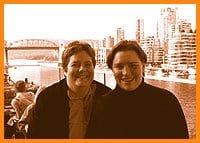About 40 years ago, Lloyd Thornhill was an excited newlywed, marrying, at that time, a woman.
He got that same feeling last week when the British Columbia Court Of Appeal ruled that prohibitions on same-sex marriage are unconstitutional, the highest court ruling yet on the issue and one that sets the stage for the federal government to finally take the issue in hand.
“I got butterflies in my stomach, like a newlywed,” says Thornhill, even though he’s been in a relationship with his partner Bob Peacock for 35 years.
Thornhill and Peacock are one of the original five couples denied marriage licences in British Columbia. Thornhill, 60, and Peacock, 55, had been thinking about marriage for a while, but couldn’t afford the legal costs of a challenge on their own. When the opportunity arose because of the financial help from the queer lobby group Egale Canada, Thornhill and Peacock jumped at it.
And they’re delighted with the results so far. Though the original lower-level court case went against them – in a decision widely seen as out of left-field – the May 1 appeals court ruling stated that the “common law bar against same-sex marriage is of no force of effect because it violates rights and freedoms,” protected by the Canadian Charter Of Human Rights And Freedoms. The decision was unanimous, stating that the common-law rule limiting marriage to opposite-sex couples is discriminatory and unjustifiable under the charter.
Though this ruling applies only in BC, it is a companion ruling to an Ontario decision last year that said much the same thing (and which has been appealed by the feds; that case was heard last month). The BC court gave the government the same deadline as the Ontario court: It must change the laws by Jul 12, 2004 or same-sex marriage is automatically legal in the two provinces.
That’s just three days before Thornhill and Peacock’s 36th anniversary. They’re thinking of a wedding on that date.
“Now we’re getting nervous about if we’re ready for marriage,” jokes Thornhill.
Since Thornhill and Peacock met in 1968, they say they’ve experienced a number of hardships, and they don’t want other queer couples to go through the same thing.
“We’ve got all the benefits from common-law,” says Thornhill. “Monetarily, marriage doesn’t mean a thing to us. Fighting for gay marriage was us wanting to do something that might help gay and lesbian youth in the future.”
Another of the BC couples, Elizabeth and Dawn Barbeau, want to get married mainly for themselves.
“We’ve always had it in our minds that we would find a life partner and commit in a monogamous relationship,” says Elizabeth.
They’ve been living together for almost seven years, and about five years ago changed their last names so they would match for the purpose of starting a family. They held a commitment ceremony at the same time.
This court challenge process makes Elizabeth proud to be Canadian. “I live in a country with a very powerful charter of rights and freedoms,” she says.
The federal government has 60 days to appeal the BC decision. Though it appealed the Ontario one, there’s growing pressure for it to let this one stand – or just go ahead and legalize same-sex marriage. A third marriage case is now in the Quebec court system.
A Liberal document leaked to the press last week said it’s likely that in the end, the Supreme Court Of Canada will favour same-sex marriage. The report rejects the idea of a national registered domestic partnership system that is being used as a substitute in Nova Scotia, Manitoba and Quebec.
Cynthia Petersen, a lawyer representing the couples, says the government should not appeal – it’s a waste of taxpayers’ dollars. She fully expected to win the case.
“It’s the obvious and just outcome,” she says.
Rev Brent Hawkes of the Metropolitan Community Church Of Toronto says the federal government should be more pro-active.
“Opinion polls and the courts say we want [same-sex marriage]. Why should we have to go all the way to the Supreme Court for our government to say okay?” says Hawkes.
One of the big questions hanging over the court rulings – and the parliamentary committee that’s preparing a report on the issue of same-sex marriage – is whether churches that prohibit homosexuality will be forced to marry same-sex couples.
Joanne Cohen, with the Coalition Of Canadian Liberal Rabbis For Same-Sex Marriage, says the courts have been clear on the point that equality rights do not trump religious rights. She interprets that to mean that no rabbi or priest would be forced to marry a same-sex couple, but no rabbi or priest would be prevented from marrying a same-sex couple, either.

 Why you can trust Xtra
Why you can trust Xtra


